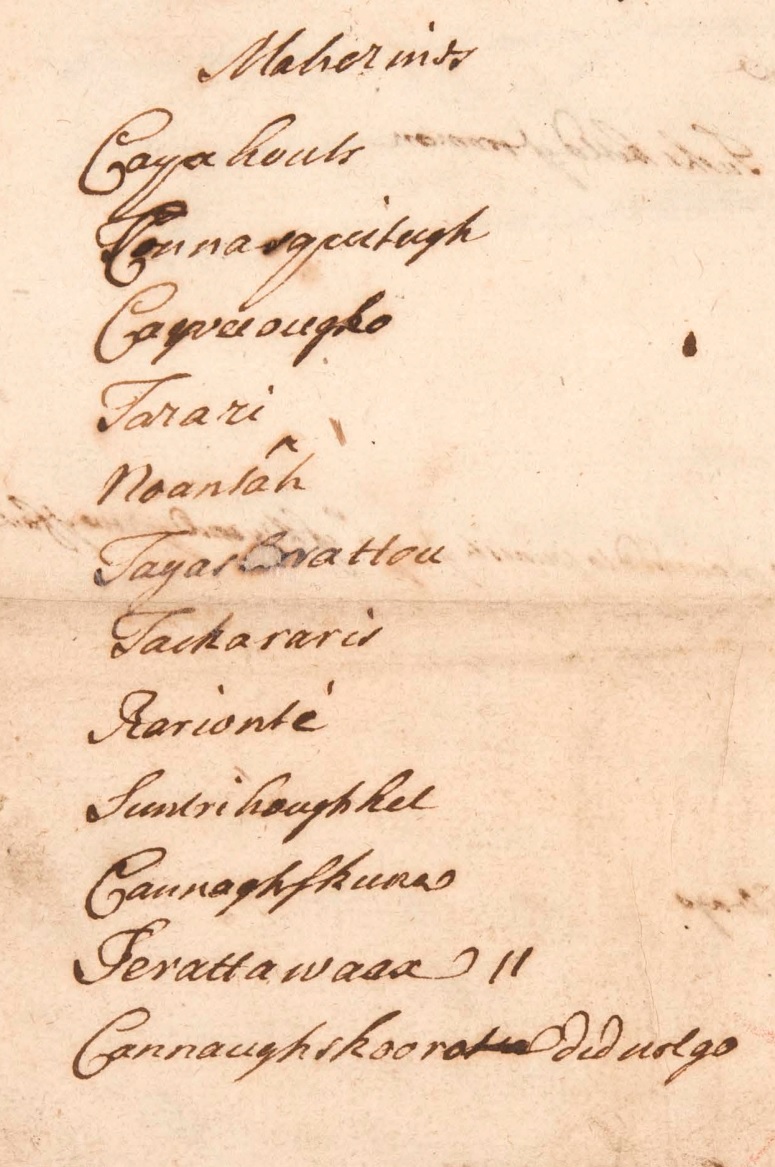Twelve Maherrin (a List of whose names they gave in at the Board) did join the Senecas and Tuscaroras and attack the Saponies at the Fort of Christanna in October last… (Mcllwaine, Vol. 111:517, December 9, 1719).

Cayahouts (Kayahots)
His name translates to: He it causes…
Connasquitugh (kanaskweʔtha)
His name translates to: He captures, slaves/people.
It was thought that his name could have been for the guy that was sent by a Clan Mother to bring back captives for adoption or for other purposes.
Careeougko ?
The “reeou” might be related to -r(i)yu- to butcher, kill on page405 of the dictionary.
ká·ryuʔ=”it killed” wild animal or anything that čan be killed
Tarari (Tharari), (Thareru)
-areru- to run
He is running toward a particular place or he runs back.
He would have been one to carry a message (wampum string).
Noantah
The “oan” might be similar to “-uwan- be chief” on page 473.
Possibly related to “ukuwanáʔthaʔ a mock chief, little old man”
Tayas[he?]rattou
Might be Teyerhúhsthaʔ ?
Possibly related to “-ne-rhuhsT- to season it or mixing it” on page 338 and 392
Tackararis
Might be related to “-kari- consume, devour” on page 282
Possibly related to “rataʔnaká·ryahs <he-village-devours> he is raising a ruckus (lit., eating up the settlement or in the house), he pillages, he ravages
Rarionte (Raʔriyúʔneʔ)
The -rio- might be related to -r(i)yu-to butcher, kill on page 405 of the dictionary. waʔkariúʔneʔ is listed as “I am a fighter” fact-I-myself-kill-cause
See also -aʔriyuʔT – to be a fighter on page 109 this listing is a little different wakaʔriyúʔneʔ is listed as “I am a professional fighter” fact-I-myself-kill-moving
So Raʔriyúʔneʔ might mean “he is a fighter”.
Suntrihoughket
Satrihakęʔ or Satrihawkęʔ or Satryukęʔ ?
Cannaghskura
Possibly related to name 2 and 12
Kanahskurę ?
where “ura” might be related to “-urę- split” on page 470
ka – nahsk – urę
he/lit – slave -spit
he/it splits slaves / captures
Kanahskuhę ?
where the ending “kura” might be “-ku-get, pick up, take” on page 302 with distributive “-hę-“
ka – nahsk – ku – hę
he/it goes and gets slaves / captives
Serattawasa
Seraʔtawaθe or Seraʔtawase or Seratawaθe or Seratawase ?
Cannaughskoora
Possibly related to name number 2 and 10
Kanahskurę ?
where “oora” might be related to “-urę- split” on page 470
ka – nahsk -urę
he/it – slave -spit
he/it splits slaves / captives
kanahskuhę ?
where “koora” might be related to “-ku- get, pick up, take” on page 302 with distributive “-hę-“
ka – nahsk – ku – hę
he/it – slave – get – going to
he/it goes and gets slaves / captives
